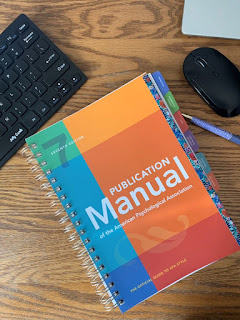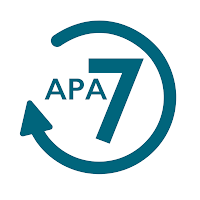Embracing the Learning Process: Transitioning from APA 6 to APA 7
It’s been 10 years since I first began my journey to master
APA. When I began working in the Writing Center in 2010, APA had just published
its sixth edition of the manual, so it was a perfect time for a new writing
instructor like myself to dive in headfirst. Those early months of learning APA
were frustrating. I can’t tell you how many times I looked up the rules for
when to use “et al.” or when exactly an issue number was needed in a reference
entry. Slowly but surely, however, I mastered APA’s rules. As I practiced
using the style, both in my own writing and by teaching
it to students, APA’s rules became second nature to me.


On the positive side, these feelings of frustration have also been productive. As
I labor over the new edition, practicing the new way to reference a webpage or
including “et al.” in all citations with three or more authors, I’m reminded
that my feelings of frustration are simply part of the learning process.
Learning often isn’t comfortable; it’s challenging, and it requires us to step
outside of our comfort zone to learn to think in a new way. And so, with this
learning process, I also am reminded of the student experience. It’s been quite
a long time since I went through the process of first learning APA, and so
learning APA 7 has given me insight into the challenges and frustrations of any
Walden student who is new to APA style.
Walden University will be adopting the seventh edition of the APA manual starting in the summer terms (May
4 for semester-based programs and June 1 for quarter-based
programs). So, very soon, much of the Walden community will be joining me in
this learning process. To support you along the way, here are a few tips from
the trenches that you may find helpful:
- Acknowledge the Challenge: Learning APA 7, like any learning, is a process; there will be frustrations and challenges along the way. Acknowledging—and if possible, embracing—this challenge will help you avoid feelings of failure if you make a mistake or frustration if it’s taking some time.
- Give Yourself Time: I’ve had 10 years to absorb APA, and it’s unrealistic to expect that I'll memorize and use APA 7 intuitively in a short period of time. Similarly, using APA 7 will add to your writing time, since you’ll most likely need to look up rules and double-check formats.
- Use Resources: Once you begin learning and using APA 7, don’t feel like you’re in this alone. The Writing Center is working on a number of resources to help you transition into using the seventh edition. We will have fully updated APA resources throughout our website, so you can use tutorials on our website and services from our writing instructors and form and style editors to support your learning of APA 7. In the mean time, you can visit our APA 7 Transition page for the latest updates and a comparison table so you can see the biggest differences in the APA editions.
- Ask Questions: Don’t forget to ask questions, too: You can email us or visit our Live Chat Hours with questions about APA 7 after the May switch dates. Your faculty and classmates can be a great source of support, too. I can’t tell you how many times I've reached out to colleagues to confirm I’m using a new APA 7 rule correctly.
We look forward to working with you as you engage in your own learning process with APA 7, and we’re pleased to support you on this journey. And hey, if you find yourself loving a new rule or experiencing a particular challenge, be sure to let us know. We’re all in this learning process together!
.png)
Never miss a new post; Opt-out at any time
Interview with Patrese Nesbitt, Walden DrPH student and 2019/2020 Writing Center Intern
Monday, March 09, 2020
Fun With Writing Center Staff
,
Staff Spotlight
,
Student Spotlight
6 comments
In 2019, Patrese began a 9-month internship with the
Writing Center, during which she learned about writing center pedagogy, giving
writing feedback to students through our paper review appointments, and attending the International Writing
Centers Association conference in Columbus, OH. We are grateful Patrese was
interested in the internship, as she is also working full time as a faculty
member and pursuing her Doctor of Public Health from Walden. She is also now a
published author on the Writing Center blog with her blog posts “The Art of Storytelling: Mastering Paraphrasing” and “How to Manage Procrastination and Brain Fog,”
where Patrese brings her unique perspective as student, faculty member, and
writing center intern to give students writing advice.
Join us in learning a bit about Patrese, how she manages so many responsibilities in her life, and her tips for other Walden student writers.
Writing Center: What are you studying at Walden?
Patrese: Doctor of Public Health (DrPH)
Writing Center: You are also a faculty member at your institution. What do you teach?
Patrese: I am an Assistant Professor and I teach Health and Physical Education at Kentucky State University in Frankfort, Kentucky.
Writing Center: How do you spend your free time?
Patrese: I spend my free time reading, working out, traveling with family and friends, watching make-up and hair tutorials, or studying about mindfulness and health.
Writing Center: You have a lot going on: How do you keep track of everything or keep yourself organized? How do you make time for it all?
Patrese: I have and stick to a “to-do” list! I have a “to-do” list at home which is a dry erase board, updated daily. My “to-do” list is just a notebook at work. As you can imagine, I’ve gone through a lot of notebooks!
Writing Center: What is your approach or goal to one-on-one paper reviews and when giving students writing feedback?
Patrese: I want to make sure the student knows that I am aware of their own personal goals of their paper review appointment. I do so by stating their goals at the start of their paper review appointment. I may also state their personal goals throughout the paper; sometimes I may ask “what do you think?” to the student to show that I am engaged but I am open to their interpretation and suggestions as well. It is a learning experience for the both of us!
Writing Center: Why or in what ways do you think students can benefit from a one-on-one paper review appointment?
Patrese: One-on-one paper reviews are an exceptional way to have an individualized review based on your goals, tasks, and abilities. I’ve benefited from a one-on-one appointment at the very beginning of the DrPH program, and it was superior! While I had the opportunity to attend writing centers at my prior institutions, one-on-one paper reviews, in an asynchronous format, feels as if the writing instructor has time to review my personal information without making me feel embarrassed!Writing Center: What have you benefited the most from or learned the most about during your Internship with the Writing Center?
Patrese: I increased my knowledge base on the number of tools the Writing Center has towards improving writing. The increased knowledge provided from the internship will help with the success of my dissertation.
Writing Center: What’s one thing you’ll take away from the Internship and use in your writing at Walden or your teaching at your institution?
Patrese: Appointments! More students should take advantage of making appointments with the Writing Center to achieve their goals as well as staying on task in their course. I will actually make more appointments! So, Beth, Amy, and Max will certainly see more of me!
Writing Center: What is the most helpful advice you’ve received about writing?
Patrese: I find myself typing how I talk, which is ok, but I firmly believe in the process of proofreading/self-editing. You learn so much about your writing style and it helps to ensure you are on task. One more note: follow the MEAL Plan for your writing as if your life depended on it!
Writing Center: Could you talk about a particular writing challenge you faced and how you overcame that challenge?
Patrese: I procrastinate! I prepared a blog about procrastination and it is something I still struggle with as a doctoral student. As one who has struggled with anxiety, I’ve used procrastination to cope with anxiety due to fearing (or overthinking) that what I am writing about is wrong, or I am off topic, and the worst can happen as a result of poor writing. Having a “to-do” is list extremely helpful and has helped me to overcome that challenge. I can always tell when I operate “away” from my “to-do” list. I am not as focused, and distractions are everywhere.
Writing Center: What’s one writing accessory you can’t live without—or something you couldn’t write without?
Patrese: A college ruled, $0.69 notebook! I carry at least one everywhere!! Especially now as I am getting closer to writing my dissertation!
Writing Center: Describe your approach to writing in three words:
Patrese: Prepare, plan, pray.
Prepare: Get all the tools that are needed; read the material that helps to reference what you are writing, use a notepad to mind-map or outline what your paper will state, and find a comfy sitting area to write your paper.
Plan: Back to the “to-do” list! Break apart difficult tasks or break apart tasks that may be big (or time consuming) and may lead to overthinking and anxiety.
Pray: or be mindful in what you are getting ready to do. Mindfulness to me means being “in the moment”. Praying helps me to get in the moment and put all my focus on the task from start, through the process, and to completion.
The Walden University Writing Center provides a broad range of writing instruction and editing services for students, including writing assistance for undergraduates, graduate students, and doctoral capstone writers.
.png)
Never miss a new post; Opt-out at any time
An APA 7 Update and Resources
We here in the Walden University Writing Center recently updated our APA 7 transition webpage to provide more information about how we’re preparing to
help Walden University students use the APA’s new style guide.
Later this year, Walden University will be fully
transitioning to the seventh and latest edition of the Publication Manual of the American Psychological Association (APA). For semester-based programs, the official transition
date to APA 7 is May 4. For quarter-based programs, the official transition
date is June 1. The university will soon share more
information about a grace period for students who are actively writing their
doctoral capstones and may choose between continuing in the sixth edition or
using the seventh edition.
To help support Walden students’ transition, the instructors
and editors of the Writing Center are working to learn the details of the new
style guide, update our instructional resources, and create new resources. For
example, these APA 6 and 7 comparison tables provide a concise preview of the significant
changes between the old and new version of the manual. These tables are just
one example of the type of resource our staff is working on to highlight and
help you learn the changes.
We also just published a WriteCast podcast episode
on a few of the APA 7 changes that we’re most excited about. Stream or download (click the connect button on the player) the episode
here, or listen on your favorite podcast app. If you have heard or read about
upcoming changes, we’d love to know which ones you are looking forward to the
most!
Please bookmark our APA 7 transition webpage to learn about when new Writing Center resources will go
live and for information about the official Walden University timelines for the
transition. We’ll continue to share updates with you on resources, training,
and timelines as we all make this exciting move together!
Any questions related to the transition to APA 7 can be directed to APA7@mail.waldenu.edu.
Any questions related to the transition to APA 7 can be directed to APA7@mail.waldenu.edu.
The Walden University Writing Center provides a broad range of writing instruction and editing services for students, including writing assistance for undergraduates, graduate students, and doctoral capstone writers.
.png)
Never miss a new post; Opt-out at any time
Subscribe to:
Posts
(
Atom
)











6 comments :
Post a Comment